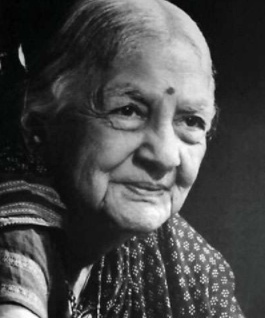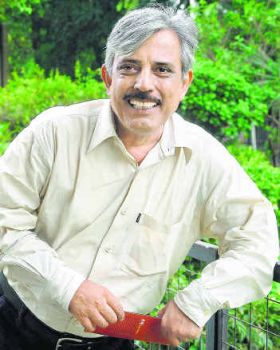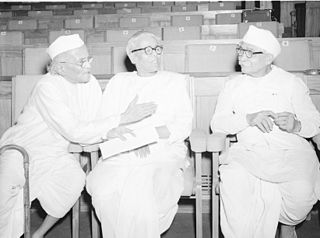Related Research Articles

Vijay Dhondopant Tendulkar was a leading Indian playwright, movie and television writer, literary essayist, political journalist, and social commentator primarily in Marāthi. His Marathi plays established him as a writer of plays with contemporary, unconventional themes. He is best known for his plays Shantata! Court Chalu Aahe (1967), Ghāshirām Kotwāl (1972), and Sakhārām Binder (1972). Many of Tendulkar's plays derived inspiration from real-life incidents or social upheavals, which provide clear light on harsh realities. He has provided guidance to students studying "play writing" in US universities. Tendulkar was a dramatist and theatre personality in Mahārāshtra for over five decades.

Girish Karnad was an Indian actor, film director, Kannada writer, playwright and a Jnanpith awardee, who predominantly worked in Kannada, Hindi, Tamil, Telugu, Malayalam and Marathi films. His rise as a playwright in the 1960s marked the coming of age of modern Indian playwriting in Kannada, just as Badal Sarkar did in Bengali, Vijay Tendulkar in Marathi, and Mohan Rakesh in Hindi. He was a recipient of the 1998 Jnanpith Award, the highest literary honour conferred in India.

Pankaj Kumar Mullick was an Indian music composer, playback singer and actor, who was a pioneer of film music in Bengali cinema and Hindi cinema at the advent of playback singing, as well as an early exponent of Rabindra Sangeet.

SoumitraChatterjee was an Indian film actor, play-director, playwright, writer, thespian and poet. He is regarded as one of the greatest and most influential actors in the history of Indian cinema. He is best known for his collaborations with director Satyajit Ray, with whom he worked in fourteen films.

Kamaladevi Chattopadhyay was an Indian social reformer and freedom activist. She was most remembered for her contribution to the Indian independence movement; for being the driving force behind the renaissance of Indian handicrafts, handlooms, and theatre in independent India; and for upliftment of the socio-economic standard of Indian women by pioneering the co-operation. She is the first lady in India to stand in elections from Madras Constituency. While she lost in the election, she pioneered the path for women in India.
Tamasha is a traditional form of Marathi theatre, often with singing and dancing, widely performed by local or travelling theatre groups within the state of Maharashtra, India. It has also been the subject of several Marathi films. Some Hindi movies have also included Tamasha-themed songs, known as Lavanis, in the past.

Pandit Bajinath Prasad also known as Pandit Lachhu Maharaj (1901–1978) was an Indian classical dancer and choreographer of Kathak dance. He came from a family of illustrious Kathak exponents in Lucknow, and also worked as film choreographer, Hindi cinema, most notably Mughal-e-Azam (1960) and Pakeezah (1972). He was awarded the 1957 Sangeet Natak Akademi Award, the highest award for performing artists, conferred by the Sangeet Natak Akademi, India's National Academy for Music, Dance and Drama. He was paternal uncle of Pandit Birju Maharaj.
Yashwant Sadashiva Buwa, commonly referred as Mirashi Buwa, was an Indian classical singer in khyal-genre of Hindustani classical music. He was a noted disciple of Balakrishnabuwa Ichalkaranjikar (1849–1926) of Gwalior gharana, along with Vishnu Digambar Paluskar. He was known for his fast taans. He was also an actor and had performed in many of the Sangeet Nataks, Marathi theatre musicals.

Bhanu Bharti is an Indian theatre director and playwright, and the founder-director of Aaj Rangmandal theatre group. Most known for his theatre productions and choreographies with tribal and folk artists, including Pashu Gayatri by K.N. Panikkar, Kaal Katha and Amar Beej, all are based on rituals of the Bhil tribe of Mewar region of Rajasthan, apart from Chandrama Singh urf Chamku Das, Yamgatha and Aks-Tamasha, counting to over 70 plays in a career spanning nearly four decades.

Siyaram Tiwari was an Indian classical singer and leading exponent of Dhrupad-genre of Hindustani classical music. He belonged to the Darbhanga gharana and was based in Patna. Though Darbhanga gharana is known for its laykari techniques, he was the first exponent of the gharana to promote fast-paced laykari in Dhrupad, which developed in the second half of 20th-century.
Gujarati theatre refers to theatre performed in the Gujarati language, including its dialects. Gujarati theatre is produced mainly in Gujarat and Maharashtra, in cities like Mumbai, Ahmedabad and Baroda, Surat and elsewhere Gujarati diaspora exists, especially North America. Rustam Sohrab, performed by Parsee Natak Mandali on 29 October 1853 in Mumbai, marked the beginning of Gujarati theatre.

Jyotsna Keshav Bhole also known as Jyotsnabai Bhole, was a veteran Marathi stage artist and a Hindustani classical singer. Along with Padmabai Vartak, she was among the first female actresses to perform the role of a female character in Marathi theatre in the play Andhalyachi Shala in 1933.
Tapas Sen was a noted Indian stage lighting designer, who was an important figure in 20th-century Indian theatre. He started working with Bengali theatre movement in Kolkata in the late 1940s, along with noted directors, Utpal Dutt and Shambhu Mitra. Later he became a founding member of the Indian People's Theatre Association's (IPTA), Delhi chapter, and worked closely with Hindi theatre. Through his career stretching five decades he worked theatre directors, Ebrahim Alkazi, Vijay Tendulkar, and also dancers Sadhana Bose, Chandralekha, Birju Maharaj and Kelucharan Mahapatra. He was known not only for his creative stage lighting, but also had a significant impact on the work of leading theatre director of the time.

Anjanibai Malpekar was a noted Indian classical singer, belonging to the Bhendibazaar gharana of Hindustani classical music.

Professor Maheswar Neog was an Indian academic who specialised in the cultural history of the North East India especially Assam, besides being an Assamese-language scholar and poet. He was a top Indologist, and his work covers all disciplines of Indian studies, folk-lore, language, dance, history, music, religion, drama, fine arts, paintings, historiography and hagiography, lexicography and orthography, epigraphy and ethnography. His research includes multi-dimensional features of Vaishnava renaissance in Assam through Srimanta Sankardev, Madhabdev, Damodardev, Haridev, Bhattadev and other Vaishnava saints of Assam.

Chintaman Ganesh Kolhatkar, also known as Chintamanrao Kolhatkar, was a well known Marathi stage actor, director, producer, and playwright.
Deba Prasad Das was an Indian classical dancer, considered by critics and connoisseurs as one of the four first generation gurus of the Indian classical dance form of Odissi. His Odissi style is robust and unique. He was a recipient of the 1977 Sangeet Natak Akademi Award. and 1974 Odisha Sangeet Natak Akademi Award.
Yamunabai Waikar, née Yamunabai Vikram Jawle was an Indian folk artist, known for her expertise in the Marathi folk traditions of Lavani and Tamasha, folk art forms involving music and dance and reported to be one of the leading exponents of the art genres. A recipient of the Sangeet Natak Akademi Award, she was honored by the Government of India, in 2012, with the fourth highest Indian civilian award of Padma Shri.
Daji Bhatawadekar, was an Indian theatre personality and film and television actor. He was credited with the revival of Sanskrit and Marathi theatre in India. A winner of the Sangeet Natak Akademi award in 1965, he was honoured by the Government of India in 1967, with the award of Padma Shri, the fourth highest Indian civilian award for his contributions to the society.
Govind Ram Nirmalkar (1935–2014) was an Indian actor and folk theatre artist, known for his contributions to the Nacha folk theatre of Chhattisgarh. His portrayal of the protagonist in Charan Das Chor, an award winning play by Habib Tanveer, won him critical acclaim. The Government of India awarded him the fourth highest civilian honour of the Padma Shri, in 2009, for his contributions to Arts. He was also a recipient of the 2012 Sangeet Natak Akademi Award.
References
- 1 2 "पुरस्कार सम्मानित कलाकारों की विवरणिका". www.sangeetnatak.gov.in. Retrieved 2016-12-20.
- 1 2 Lal, Ananda (2004-01-01). The Oxford Companion to Indian Theatre. Oxford University Press. ISBN 9780195644463.
- ↑ Ltd, Durga Das Pvt (1985-01-01). Eminent Indians who was who, 1900-1980, also annual diary of events. Durga Das Pvt. Ltd.
- ↑ Varadpande, Manohar Laxman (1987-01-01). History of Indian Theatre. Abhinav Publications. ISBN 9788170172789.
- ↑ Sangeet Natak. Sangeet Natak Akademi. 1969-01-01.
- 1 2 Economic and Political Weekly. Sameeksha Trust. 1980-01-01.
- ↑ (India), National Centre for the Performing Arts (1972-01-01). Quarterly Journal.
- ↑ Maloney, Clarence (1978-01-01). Language and Civilization Change in South Asia. Brill Archive. ISBN 9004057412.